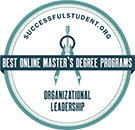
M.A. in Organizational Leadership – Organizational Development Consulting
Become a Sought-After Problem Solver. Explore Organizational Development Consulting.
The Master of Arts in Organizational Leadership (MAOL) – Organizational Development Consulting delves into consulting as both a process and a career. Learn to consider consulting challenges and the role of leadership in developing and guiding strategic change. You’ll practice solving problems through collaboration, communicating effectively in actual leadership situations, and conducting research, and presenting findings on contemporary issues. There are no GMAT/GRE requirements for this MAOL degree program. You can gain advice from seasoned business professionals through the Executive Mentor Program. Regent has been ranked among top national universities by the U.S. News & World Report, 2023, and has also been ranked as a Top 10 Military Friendly® School by Military Friendly®, 2023-24. Experience the difference of a transformative MAOL – Organizational Development Consulting program.
Careers | Other Concentrations | Courses | Admissions | Tuition
LEARN TO SPOT PATTERNS & PROBLEMS
Explore tools and research to effectively audit, assess, and implement changes required for organizational development.
SPECIALIZE IN STRATEGY & ORGANIZATIONAL DEVELOPMENT CONSULTING
Gain expertise in intervention strategies and contingency frameworks that can be applied in multiple industry settings.
BE YOUR OWN BOSS
Build a consulting business that handles multiple clients, setting your own schedule, and retaining all profits.
You will learn key organizational leadership elements such as ethics, motivation, creativity, vision, strategic planning and teamwork from our award-winning faculty.
MAOL-Organizational Development Consulting Career Opportunities
After completing your master’s in organizational development consulting, you can:
- Solve complex problems and create invaluable strategies for your clients.
- Analyze assessments that measure an organization’s success and effectiveness, such as customer surveys, communication audits, attitude surveys, and compliance audits.
- Improve the financial and operational health of your client’s organization.
Career Opportunities
- Corporate & Small Business Consulting
- Executive Leadership
- Analytics & Strategic Planning
2024-25 Semester Check-In Deadlines
All students are expected to check-in for the semester two weeks before the session start date. Students should apply, be accepted, enroll in their first courses, and confirm a plan to pay for their courses prior to this date.
| Session | Semester Check-In | Session Start Date |
|---|---|---|
| Session A | Friday, August 9 | Monday, August 19 |
| Session M | Friday, September 6 | Monday, September 16 |
| Session B | Friday, October 11 | Monday, October 21 |
| Session C | Wednesday, January 8 | Monday, January 13 |
| Session T | Friday, January 31 | Monday, February 10 |
| Session D | Friday, March 7 | Monday, March 17 |
| Session E | Friday, May 2 | Monday, May 12 |
| Session F | Friday, June 13 | Monday, June 23 |
Admissions Requirements
Step 1: Apply to Regent University
Submit your application using the Regent University Online Application.
Note: If you are unable to complete our application due to a disability, please contact our Admissions Office at 757.352.4990 or admissions@regent.edu and an admissions representative will provide reasonable accommodations to assist you in completing the application.
Step 2: Submit Your Unofficial Transcripts
Submit your unofficial transcripts to regent.edu/items.
Upon submitting your application, you will receive an email requesting authorization for Regent University to obtain your official transcripts from your U.S. degree-granting institution. International transcripts must be evaluated by a NACES, AACRAO or NAFSA approved agency.
Step 3: Submit Your Government-Issued ID
To ensure academic integrity, Regent University requires a copy of a government-issued ID. Please submit a scanned copy or photograph of it to regent.edu/items.
Please feel free to contact the Office of Admissions at 757.352.4990 or admissions@regent.edu should you have any further questions about the application process.
Note: All items submitted as part of the application process become the property of Regent University and cannot be returned.
PART-TIME STUDENTS
| Degree | Tuition Cost Per Credit Hour | Average Credit Hours Per Semester | Average Tuition Per Semester |
|---|---|---|---|
| Master of Arts (MA) / Master of Science (MS) | $695 | 6 | $4,170 |
| Master of Business Administration (MBA) | $695 | 6 | $4,170 |
| Doctor of Business Administration (DBA) | $1,020 | 3 | $3,060 |
| Doctor of Philosophy in Organizational Leadership (PhD) | $1,020 | 3 | $3,060 |
| Doctor of Strategic Leadership (DSL) | $1,020 | 3 | $3,060 |
Full-Time Students
| Degree | Tuition Cost Per Credit Hour | Average Credit Hours Per Semester | Average Tuition Per Semester |
|---|---|---|---|
| Master of Arts (MA) / Master of Science (MS) | $695 | 9 | $6,255 |
| Master of Business Administration (MBA) | $695 | 9 | $6,255 |
| Doctor of Business Administration (DBA) | $1,020 | 6 | $6,120 |
| Doctor of Philosophy in Organizational Leadership (PhD) | $1,020 | 6 | $6,120 |
| Doctor of Strategic Leadership (DSL) | $1,020 | 6 | $6,120 |
Student Fees Per Semester
| University Services Fee (On-Campus Students) | $850 (Fall & Spring) $700 (Summer) |
| University Services Fee (Online Students) | $700 |
Part-Time Students
| Degree | Tuition Cost Per Credit Hour | Average Credit Hours Per Semester | Average Tuition Per Semester |
|---|---|---|---|
| Master of Arts (MA) / Master of Science (MS) | $695 | 6 | $4,170 |
| Master of Business Administration (MBA) | $695 | 6 | $4,170 |
| Doctor in Business Administration (DBA) | $1,020 | 3 | $3,060 |
| Doctor of Philosophy in Business (PhD) | $1,020 | 3 | $3,060 |
| Doctor of Philosophy in Organizational Leadership (PhD) | $1,020 | 3 | $3,060 |
| Doctor of Strategic Leadership (DSL) | $1,020 | 3 | $3,060 |
Full-Time Students
| Degree | Tuition Cost Per Credit Hour | Average Credit Hours Per Semester | Average Tuition Per Semester |
|---|---|---|---|
| Master of Arts (MA) / Master of Science (MS) | $695 | 9 | $6,255 |
| Master of Business Administration (MBA) | $695 | 9 | $6,255 |
| Doctor in Business Administration (DBA) | $1,020 | 6 | $6,120 |
| Doctor of Philosophy in Business (PhD) | $1,020 | 6 | $6,120 |
| Doctor of Philosophy in Organizational Leadership (PhD) | $1,020 | 6 | $6,120 |
| Doctor of Strategic Leadership (DSL) | $1,020 | 6 | $6,120 |
Student Fees Per Semester
| University Services Fee (On-Campus Students) | $850 (Fall & Spring) $700 (Summer) |
| University Services Fee (Online Students) | $700 |
*Rates are subject to change at any time. The per-credit-hour tuition rate is for SBL master’s level courses only. Concentration courses taken from the other schools at Regent University are charged at that school’s tuition rate.




